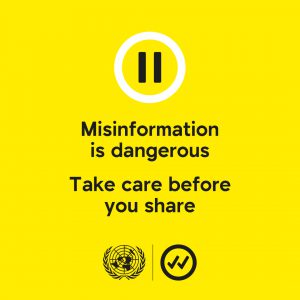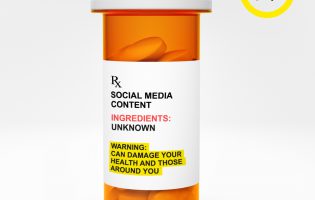In my first blogpost the overall topic was the right to information in sustainable development and I touched upon the importance of the right to correct information, especially in times of crisis. The ongoing Covid 19 pandemic is not only a health emergency – it’s also a communication emergency. It’s an infodemic.
”As soon as the virus spread across the globe, inaccurate and even dangerous messages proliferated wildly over social media, leaving people confused, misled and ill-advised.
The antidote lies in making sure that science-backed facts and health guidance circulate even faster, and reach people wherever they access information.”
António Guterres, United Nations Secretary General
What is an Infodemic?
In a joint statement published by WHO (2020) it is described as “an overabundance of information, both online and offline. It includes deliberate attempts to disseminate wrong information to undermine the public health response and advance alternative agendas of groups or individuals. Mis- and disinformation can be harmful to people’s physical and mental health; increase stigmatization; threaten precious health gains; and lead to poor observance of public health measures, thus reducing their effectiveness and endangering countries’ ability to stop the pandemic”.
The term infodemic is not new but the speed of the information is. In the digital channels Covid 19 infodemic spread in realtime and reaches further and faster than in other epidemics.
According to WHO the Covid 19 crisis the first pandemic in history where technology and social media play a massive role in keeping people informed, safe and connected. This is not a surprise since we live in a digital age. However, the same set of technology is amplifying and enabling an infodemic and are impeding global response and stirring unrest. According to Eriksen (2014) speed is an important feature of globalization and that is definitely a factor here. The virus is spreading fast and also the communication around it, for better and for worse.
The UN has called upon all member states to develop and implement science and evidence-based action plans to mitigate the harm from misinformation and disinformation. And below I will provide an example of what the UN did themselves.
The Verified initiative
In May 2020 the UN launched the Verified initiative. The team of researchers and communicators working with the initiative are creating content based on the latest facts and information generated by the World Health Organization, United Nation and other UN agencies. On this platform there is also content about the risks of misinformation and the spread of it. This to promote facts and science, solutions and also to inspire solidarity. The initiative provides content in nine different languages.
Become an information volunteer
A participatory part of this initiative is that citizens across the world can take part and become an information volunteer – or as described a “digital first responder”. The idea is to register with Verified and then on a daily or weekly basis receive verified content optimized to share on various social media platforms. In this way accurate and trusted information is shared in networks and with the purpose of directly counter disinformation with facts and mitigating the spread of misinformation. It will also fill in gaps regarding the COVID 19 crisis. This way the content can also be shared in local communities and smaller networks of people and not only become something shared by big international organizations (even if they are involved in the process of securing the accuracy of the content). The Verified initiative will also address other issues than the current situation of the Covid 19 pandemic.
#takecarebeforeyoushare campaign

The most effective way stop false information is to stop the spread of it. The #takecarebeforeyoushare campaign is a part of the Verified Initiative and was launched on World Social Media Day 30th June. It is not only to raise awareness about the consequences of sharing misinformation, but an attempt to try and make an impact on behavioural patterns when it comes to how people share content on social media. Many often share on impulse based on emotions in that very moment. The message here is to reflect first.
The campaign goals are:
- Remember the phrase “Pause, Take care before you share” and live up to that
- By using the hashtag #takecarebeforeyoushare, share stories and other people’s experiences of the impact of fake news and misinformation.
- Share accurate and trustworthy content created by the United Nations
Misinformation and disinformation are not new problems. Propaganda has for example been around a long time. And there are today several fact checking organizations working on mitigating misinformation and fake news in general. But when something like this pandemic affects everyone on this global scale it is certainly interesting how this problem sneaks in on all levels, all the way into the world’s most powerful political arenas. This virus can’t be beaten with opinions, political views or by down-playing it to the public. Apart from the medical research perspective it is crucial with accurate information and telling the truth, so people can make healthy choices. The fake news are not only fake – they can be very harmful too.
What do you think of the Verified initiative? Will it make a difference?
References
Eriksen, Thomas Hylland (2014). Globalization: The Key Concepts (2nd and revised ed.). New York: Bloomsbury
Verified Initiative
https://shareverified.com/en


